Atlantic Hurricane Season and Its Impact on the U.S. Energy Sector
See how the Atlantic hurricane season affects the American energy market and how companies can control financial risks in this scenario.
Hurricanes are tropical storms that form cyclones over the warm waters of the ocean. These circular weather phenomena are classified by the Saffir-Simpson scale, ranging from 1 to 5. Category 1 hurricanes can reach wind speeds between 74-95 mph (119-153 km/h), while the most intense (categories 3-5) can exceed 157 mph (252 km/h).
With such powerful winds and rain, hurricanes can cause extensive damage to entire cities in America, putting pressure on the national economy. Additionally, the hurricane season significantly impacts the country’s energy sector, which has many oil refineries located in high-risk areas.
 Victor Arduin, Energy and Macroeconomics Analyst at Hedgepoint, discussed the main impacts of this season on the American oil market and its influence on the global market. Enjoy the read!
Victor Arduin, Energy and Macroeconomics Analyst at Hedgepoint, discussed the main impacts of this season on the American oil market and its influence on the global market. Enjoy the read!
The Hurricane Season in America
The Atlantic hurricane season starts on June 1st and lasts until November 30th. Historically, the peak of activity in the ocean is around September 10th, but there are other intense occurrences between mid-August and mid-October. The National Oceanic and Atmospheric Administration (NOAA) has published a graph showing the historical data from the last 100 years:
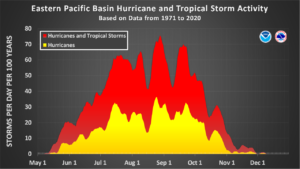
Source: NOAA
Various regions of the United States suffer from the intense winds and rains caused by hurricanes. The most affected areas are the Atlantic and Gulf of Mexico coastlines, Puerto Rico, the Virgin Islands, Hawaii, and parts of the southwestern United States.
For 2024, NOAA predicts a more intense hurricane season with an 85% chance of being above normal. The La Niña phenomenon and high ocean temperatures are the main factors that could intensify this climatic event. The agency expects 4 to 7 major hurricanes this year. The first alert was issued on June 17th, and its potential impact could be greater in the southern United States.
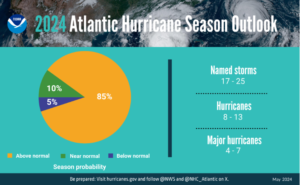
Source: NOAA
In economic terms, the hurricane season also has its impact. Hurricane Katrina was recorded as the most financially devastating. The Insurance Information Institute quantified the losses caused by the 10 largest American hurricanes through insurance claims. Check out their report:
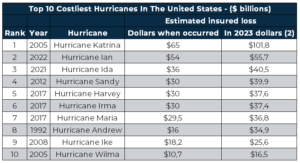
You can also follow an interactive NOAA map to view and analyze historical information about the largest hurricanes ever recorded in the Atlantic. The National Hurricane Center also provides a table quantifying event since 1851.
Read also:
- Hedging in energy: how to manage price risks in this market?
Impact of the Hurricane Season on the Oil Market
The high likelihood of an intense hurricane season help has raised concerns in the U.S. energy production sector. According to the U.S. Energy Information Administration (EIA), most of the country’s offshore refineries produce oil and natural gas.
Located in areas with higher hurricane incidence, these refineries are subject to the intense rains and winds caused by these phenomena. According to Victor Arduin, the oil market primarily suffers because production is interrupted during severe weather events.
“We see the interruption of oil and refined product production for safety reasons. These stoppages can cause significant fluctuations in prices and supply within and outside the U.S.,” says Arduin.
According to the EIA, GOM crude oil production accounted for 14% of the U.S. total in 2023. Meanwhile, Gulf Coast refineries represent nearly 50% of the U.S. production capacity.
The institution recently published a graph highlighting the reduction in oil production due to hurricanes. The periods of production stoppage are short but significant. See below:
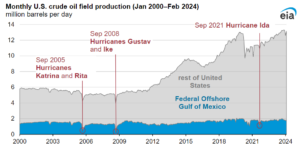
Source: EIA
“When refineries stop producing, we see increased pressure on gasoline and diesel prices. Such supply shocks directly impact future energy market contracts,” says Arduin.
Read also:
- Futures contract: how does it work in the grain and oilseed market?
According to Arduin, production interruptions have significant effects on both the American and global oil markets. With lower inventory levels, fuel prices rise in the country and subsequently reflect globally.
Furthermore, the professional explains that American oil exports also decline during severe climatic events. Victor notes that importing countries must seek supply from other nations, often paying more or spending more on new logistics.
“Another country won’t be able to buy oil from the U.S. due to the sudden low supply. Therefore, they need to look for other exporters, even if it costs more. This is the global effect of hurricanes, which quickly drives up prices,” concludes Arduin.
The pressure on oil prices increases with the hurricane season, and the market needs to adapt to price conditions. Last year, the IEA estimated a 25 to 30 cent increase per gallon of gasoline in cases of high-impact hurricanes. Using data from 2013-2022, the institution created a table representing the potential reduction in oil production in 2023 if there were intense climatic events.
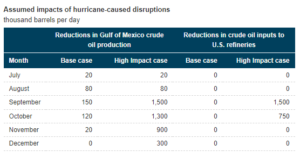
How the Market Prepares for the Atlantic Hurricane Season
As highlighted by the Hedgepoint specialist, fuel prices tend to fluctuate during hurricane seasons. An abrupt halt in U.S. production directly affects supply in both national and international markets.
To manage the financial risks arising from these events, the market uses advanced hedging tools. These products aim to mitigate price variables and minimize potential business impacts.
“During the hurricane season, it is possible to implement hedging strategies to manage financial risks and control price fluctuations,” says Victor.
In such a volatile market, it is essential to have a professional hedging partner with extensive knowledge of the energy sector. Contact Hedgepoint to learn more about these tools that can benefit your business.
This electronic mail message (‘email’) was sent by Hedgepoint Global Markets LLC and its affiliates (“HPGM”). This information is intended solely for the personal and confidential use of the designated recipient named therein and may be legally protected information under banking secrecy, professional secrecy and/ or Personal Data Privacy Laws. HPGM treats your data according to our Privacy Notice accessible on https://Hedgepoint global.com/privacy-notice/. This email may not be redistributed, retransmitted disclosed, in whole or in part, in any form or manner, without the prior written consent of HPGM and any unauthorized use or disclosure is prohibited. If you are not the designated recipient, you are requested to notify the sender immediately and to delete all copies. The use of disclosure to or sharing of such information with third parties is strictly prohibited. Non-compliance with these disclosure restrictions may result in being held liable for civil and criminal penalties. The information contained herein and any documents that may be attached/enclosed/referred may contain and/or refer to details, elements and/or work products resulting from or connected to services provided by the HPGM to a client/customer or, where applicable, a principal. This document has been prepared for informational purposes only and opinions and conclusions expressed do not necessarily represent those of HPGM. All pricing is indicative, and all estimates and opinions included in this document are as of the date of the creation of the document and may be subject to change without notice. HPGM does not represent or warrant the accuracy and completeness of the information contained herein or any document attached hereto and will not be responsible or liable to you or any third party for the consequences of reliance upon any opinion or information contained herein or for any omission therefrom. This email has been scanned for viruses, but it is your full responsibility for virus-checking. HPGM shall not be liable to you or any third party for any viruses. All email communications may be reviewed by HPGM’s authorized personnel and may be provided to regulators or others with a legal right to access such information. Further information is available on our website. HPGM does not provide legal, tax or accounting advice and you are responsible for seeking any such advice separately. This email is not a solicitation to buy or sell commodity interests. There is a substantial risk of loss in trading commodity interests. Past performance is not necessarily indicative of future results. Hedgepoint does not act as Commodities Trading Advisor and customers should rely on their own independent judgement and outside advisors before entering in any transaction that are introduced by the firm. Hedgepoint Schweiz AG is organized, incorporated and existing under the laws of Switzerland. Hedgepoint Commodities LLC is authorized and regulated by the Commodity Futures Trading Commission – CFTC and the National Futures Association – NFA to act as an Introducing Broker. Hedgepoint Global Markets DTVM Ltda. (current corporate name of ED & F Man Capital Markets DTVM Ltda.) is authorized and regulated in Brazil by the Central Bank of Brazil (BACEN) and the Brazilian Securities and Exchange Commission (CVM). Ouvidoria Brasil | Ombudsman Brazil: 0800-878-8408.”






